TuneCore Vs DistroKid [An Honest Comparison]
Jul 29, 2022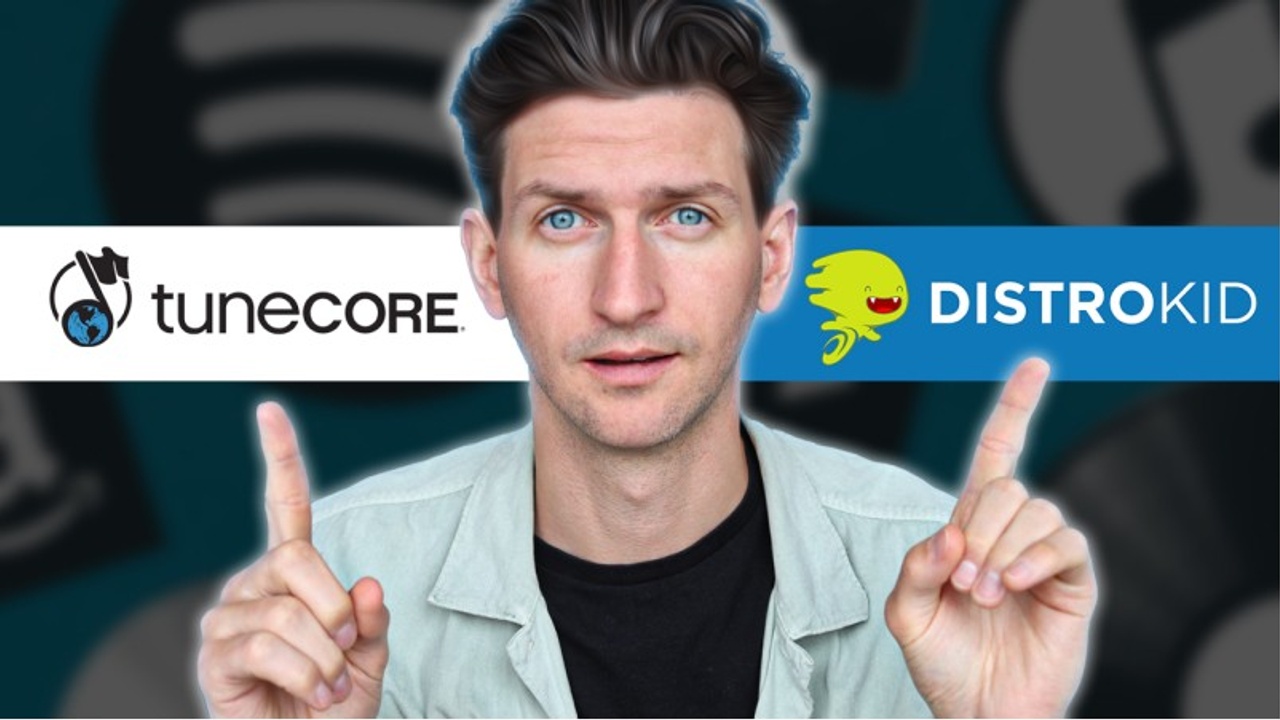
In this post I will be doing an honest comparison on TuneCore vs DistroKid who are some of the biggest players when it comes to music distribution platforms.
I'm an indie musician and I have released many songs under the name Charles Cleyn which has provided me hours of hands on experience with TuneCore and DistroKid.
I'm going to share my honest opinion, experience, and extensive research that I've curated with both, platforms, leaving no stone unturned. If you have any questions after reading this post, feel free to reach out to me.
But first, is there a quick answer to choosing TuneCore or DistroKid?
I would recommend getting started with either one. To be honest, both are great and both will get the job done.

At the end of the day, you're looking for a platform to either upload your music to Spotify or Apple Music, right? Or let's say another popular service like getting your music on TikTok.
Both of these will do that for you!
The comparison and discrepancies lie in the details of their cost, features, royalties, and customer service. Which we will be going over in detail!
So, with that, remember to:
-
Don't overthink your decision about which music distributor you should go with. Getting started is the hardest part and most of them almost to the exact same thing.
-
If you mess up and you signed up with TuneCore but you really thought you should sign up with DistroKid, you can always switch your music distributor. It's a long process, but it's 100% possible.
With all the preamble out of the way, in order to make this review and comparison easily digestable, I'd like to break it down into 5 different topics.
Let's look compare TuneCore vs DistroKid over the following bullets:
- Distribution
- Cost
- Extra Features
- Getting Paid
- Customer Service
If you'd prefer to watch and listen to a video review on how each music distributor stacks up against one another, then you can watch a review of TuneCore vs DistroKid here.
By the way, because I am affiliated with both platforms, I have the opportunity to offer you a 20% discount to TuneCore or a 7% discount to DistroKid. This kicks me back a couple bucks and it also gets you started on the right track too. Sign up at the links below and you'll receive your discount on check out:
Let's move on and quickly get everyone on the same page to what music distribution actually is. Feel free to skip this section if you're comfortable with the definition and meet us in the quick comparison chart section.
What Is Music Distribution?

Let's quickly get everyone on the same page with what music distribution is.
A music distributor is a company that will take your mastered song and upload to a variety of different streaming services around the world. Most music distributors will upload your song to Spotify, Apple Music, Youtube Music, Amazon, Tidal, Deezer, TikTok, Instagram, and all other major music streaming services.
They essentially are middlemen between you and the streaming service.
You can go to Youtube and Soundcloud and upload your song directly to those platforms, right? Well, you can't with a lot of other major music streaming services, like Spotify and Apple Music. There is a middleman you need to go through. This is why you need a music distributor.
There is a cost to upload your music with a music distributor and it usually comes in an annual fee. As it does with both DistroKid and TuneCore. However, some other music distributors like CD Baby have a one time fee.
Furthermore, some music distributors offer free music distribution but in return take a cut of your music royalties. For example, CD Baby will take a 9% cut in royalties. Amuse and United Masters, who are new to the music distribution game, also offer free music distribution with a percentage cut in music royalties.
TuneCore and DistroKid both have an annual fee and in return will give you 100% of your music royalties. Much more on this later.
Besides a music distributor uploading your music to all the music streaming platforms they do offer a variety of features that can help you with your music marketing. For example, Spotify pre save landing pages, music admin publishing, youtube content ID tracking, artwork design generators, or video generators.
Now that we are all on the same page of what a music distributor is, let's dive deep comparing both TuneCore and DistroKid. We need to ask ourselves, who is better? Is TuneCore worth it? Is DistroKid worth it?
Let's find out.
TuneCore vs DistroKid Comparison Chart
To keep things very simple before diving in, here's a quick TuneCore vs DistroKid Comparison chart that will give you a glance over of what we will be discussing in more detail throughout this post.

You might notice some things on this chart like DistroKid's "Not Good" customer support or TuneCore's "Quite Good". Let's dive into the details of this chart with goal of helping you pick a music distributor that is right for you.
1. Distribution
Is TuneCore better at distributing your music than DistroKid? Or is it the other way around? In this section, let's take a look at where each platform distributes their music.

If you're just looking to upload your song to all the major streaming services like Spotify, Apple Music, Youtube Music, Amazon Music, TikTok, Instagram, Tidal, Deezer, Pandora then you can rest assure that both DistroKid and TuneCore will upload your music too all of these for you.
In short, if you only want the main streaming platforms, both platforms are 100% the same.
If you're looking for something more niche then you will have to do some digging to understand if they will distribute your music to your desired streaming service. For example, Qobuz, is a French music streaming service.
After doing some digging we can see that DistroKid will upload your music to Qobuz and TuneCore will upload your music to Qobuz as well.
TuneCore also lists the streaming services that they upload too. However, I couldn't find a list of streaming services that DistroKid uploads too. If I'm going to rant on DistroKid, I guess this would be one thing that really annoys me about them. DistroKid does a terrible job at providing information on their platform. For example, it's quite difficult to find their pricing page because their website is so simple. I mean, simple is good, but come on, they could get better at giving the interested person more of an idea on what they can expect with the platform.
Okay, enough ranting, let's keep moving.
Both TuneCore and DistoKid will distribute your music to the main platforms. If you're looking to get on a very niche streaming platform to promote your music, be sure to browse their websites on TuneCore.com or DistroKid.com to find if they have the service you'd like.
Distribution Winner: TuneCore and DistroKid
2. Cost
Let's review the cost of each distributor to find out whether TuneCore or DistroKid is cheaper.

There is a lot to consider when we are reviewing cost for both of these distributors. Each platform charges an annual fee to get your music uploaded but they also offer different features for each of their plans.
What features are you most interested in?
Here are some valuable features for an independent artist that you might consider while you're judging cost:
- Scheduled Release Date
- Customizable Label Name
- Customer Support
I think it's important that you understand what features you need for your music career success before deciding on a music distributor. This will help you decide which distributor is best for you.
The above three features are important to me because.
- Release Date: I know that I want to create a facebook or instagram marketing campaign around my release so I need to be sure that I can choose a release date in the future so I can tell my audience about it.
- Label Name: It's important to me that I can choose my own label name. For example, I don't like it when it says TuneCore or DistroKid on Spotify when you view the song credits.
- Customer Support: It's important to me that I get answers to my questions when I need them so I'm not feeling left in the dark. This is especially important if you are a new artist.
Now that we have a bit of a guiding light on the features that are important, let's compare the cost of TuneCore and DistroKid.
How Much Does DistroKid Cost?
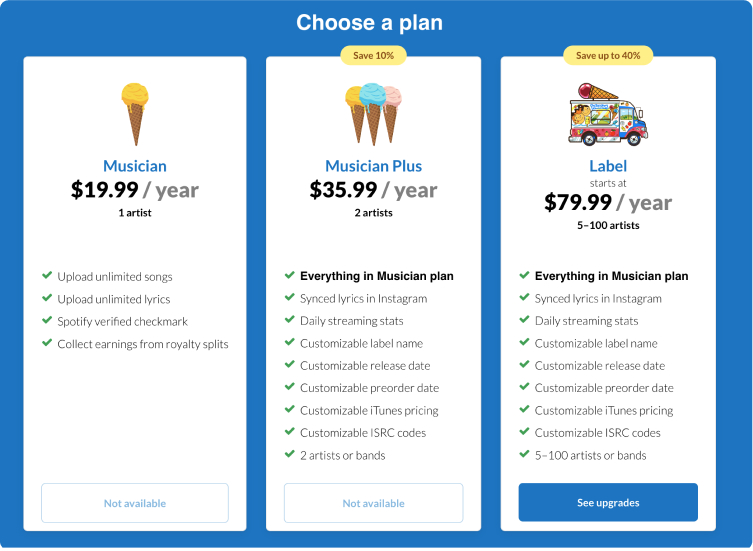
DistroKid has three pricing plans that you can choose from. Let's take a look at each of them from the perspective of the features that are important to us. Unforunately, I cannot link to the DistroKid pricing plan. You must sign up to DistroKid to see the pricing plan. I wish they didn't do that.
Musician Plan $19.99 USD/year
This is the first DistroKid plan and it's the cheapest at $19.99 USD per year. You get unlimited releases, which is awesome, at a really good price. However, it's not great for me because it doesn't include the features that I need, so I'm going to pass on this one. If you don't care about the features that I do, this plan could be perfect for you. That's why thinking about the features before hand is crucial.
Musician Plus Plan $35.99 USD/year
This is the second DistroKid plan that comes in at $35.99 USD per year. It includes everything in the musician plan, plus more. If we read over the features included it covers everything that is important to me, minus customer service. There is no mention of customer service.
Label Plan $79.99 USD/year
This is the most expensive DistroKid plan coming in at $79.99 USD per year. Judging by the name, I would assume this plan is attractive to independent labels. As an indie musician myself, this plan is "too much" for me. I don't need 5 - 100 artists. I'm going to pass on this one. Still no mention of customer service but we'll talk more about this in the customer service section.
How Much Does TuneCore Cost?
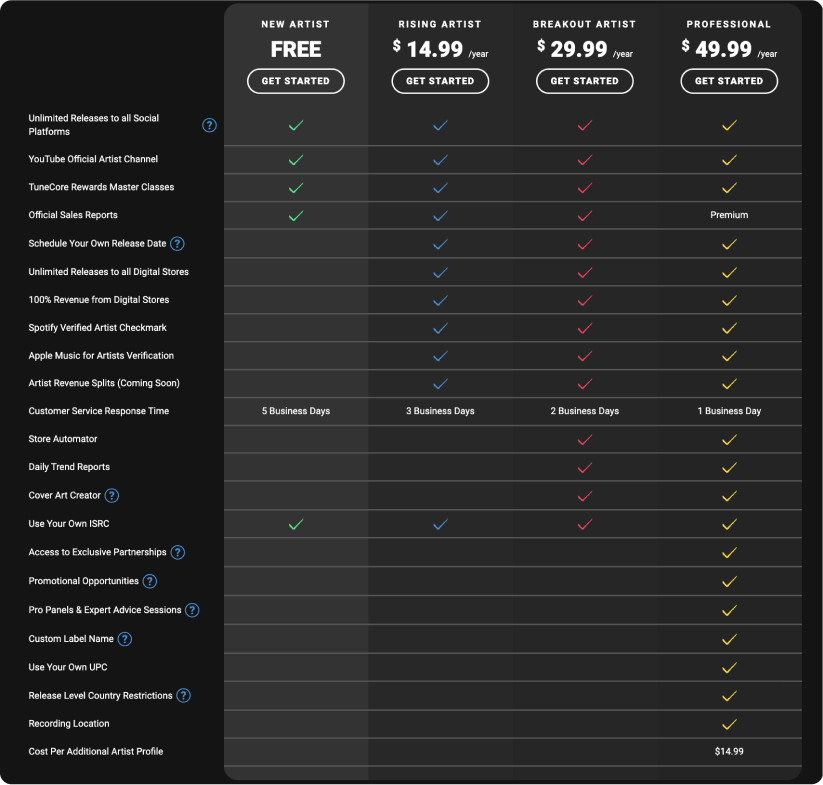
TuneCore has four different pricing plans.
You can see there is a FREE option on TuneCore which is an attractive option because, well, you can't beat free! Besides the free option, there are three plans that we can compare to DistroKid's three plans.
New Artist Plan Free
This plan gives you the opportunity to release unlimited music for free. Sounds amazing right? Yes, it pretty much is. However, you are limited to what music platforms you can release your music too.
Notice that if you go to the TuneCore pricing page and hover over the information bar. You'll see that with new artist free plan, you can only upload your music to TikTok, Facebook, Instagram, and Youtube.
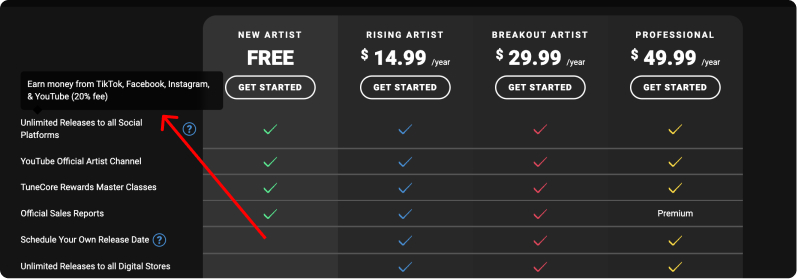
This is a great option for beginner artists who are just testing the waters. However, as an indie artist myself, I would like to have music uploaded to the major streaming services like Spotify and Apple Music so I will pass on this plan.
Rising Artist Plan $14.99 USD/year
The rising artist plan comes in at $14.99 USD per year. If we look at the features it offers from the perspective of the features that are important to me. It has all of them including customer support. However, we are missing customizable label name. If you're unsure what the label name is, it is the name located on the song credits. Take the Spotify example below for my song Don't Start Now. If you didn't have a custom label name, it would say TuneCore or DistroKid here instead. It's not

It's not a big deal for some people so if it isn't for you, more power to your, however, for me, I want to have a custom label name. I will have to pass on this one but this is a great plan those indie artists just starting out. You must ask yourself, are the features included in this plan what you're looking for?
Breakout Artist Plan $29.99 USD/year
The cost of the breakout artist plan is $29.99 USD per year. Not much is different between this plan and the Rising Artist plan. However, there are a couple extra features you get with the Breakout Artist plan. For instance, store automator, trend reports, and cover art creator. This could be great for you but it's not that important to me so I'm going to pass right now.
Professional Plan $49.99 USD/year
This is TuneCore's top tier plan and it costs $49.99 USD per year. It comes fully loaded with every feature you might want. Therefore, when it comes to features, it has everything that I need. Including customer service response of 1 business day. That is very valuable.
Is TuneCore cheaper or DistroKid?

If we simply look at the pricing pages we can see that TuneCore is cheaper. They not only offer a free plan which is the cheapest you can get. Their first tier pricing plan starts at $14.99 and if we compare that to DistroKid's first tier pricing plan, which is $19.99. Therefore, TuneCore is the cheaper option.
However, as you know by now it's a little more complicated than that. It depends on the features you need for music indie music career and both TuneCore and DistroKid structure their features very differently.
If we're comparing cost based on the features that are important to me then I would say DistroKid is cheaper. They offer a pricing plan at $35.99 which covers most of the features that I'm looking for. However, they did not mention customer support. In order to get the features that I need with TuneCore I would have to sign up with their professional plan at $49.99.
Winner: TuneCore
Winner (including features): DistroKid
Extra Features
In this section, let's cover the extra features that TuneCore and DistroKid offer. These are features that are not necessarily on their pricing plan pages. They are "add ons" or extras that you can pay for besides music distribution.
Yes, you guessed it, this will also affect the cost and your decision on what music distributor you should choose. As you'll start to notice, the more extra features or "add ons" that you pay for, will end up increasing your annual cost.
Let's take a look at some of the extra features on DistroKid first.
DistroKid Extra Features
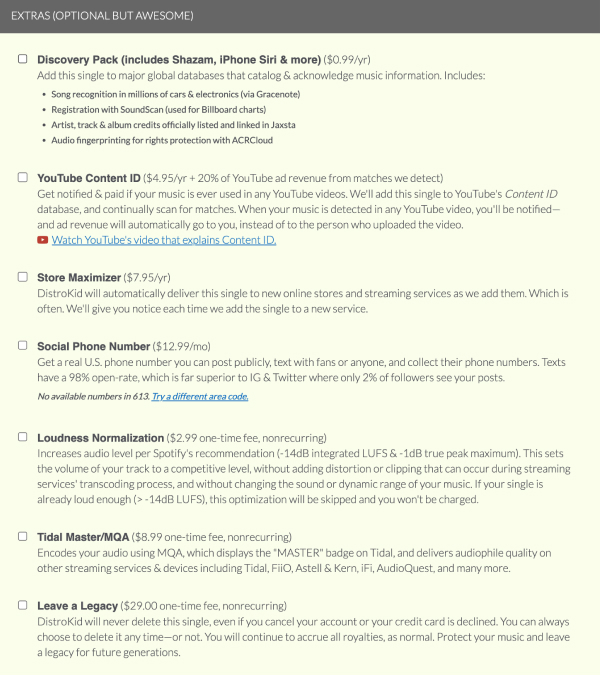
There's a good variety of extra features that DistroKid offers. Each will cost you a different amount. Let's briefly talk about the benefits of each of the extra features below and then touch on a few extra features not mentioned here.
Discovery Pack 0.99/year
This is hardly going to break the bank but it is on a per song basis. If you have 20 songs signed up with the discovery pack then that's $20 bucks per year. It also never ends. This is a really good feature though if you want your song to show up on Shazam.

Youtube Content ID 4.95/year + 20% revenue
This is ideal if you think someone else is going to use your song in a Youtube video. They'll make sure you get paid for it!
Store Maximizer $7.95/year
If new streaming services come online then thy will automatically add your song to them. This could help extend your reach to new territories but it's also going to cost you. Do you need more streaming services besides the main ones of Spotify, Apple Music, Youtube, TikTok, and Instagram?
Social Phone Number $12.99/month
This is a very cool feature which I haven't come across on most music distributors yet. You get a phone number, for a monthly fee, that you can text with fans. Pretty cool, right? Could be your next big marketing idea for your new release.

Loudness Normalization
This features will make sure your song is loud enough for Spotify and all other streaming services. I don't use this feature because I have my tracks mastered and I'm aware that they are loud enough. If you don't want to hire a master engineer to work on your track then this could be a good option for you. However, I doubt it's a good as a real mastering engineer. You never know these days though, computers are getting quite smart!
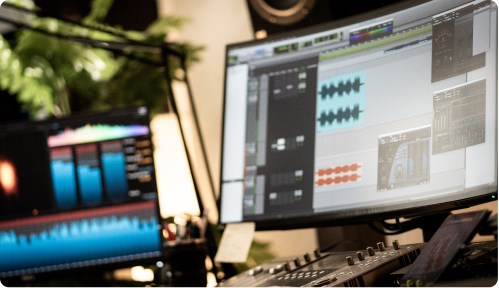
Tidal Master/MQA $8.99
If you want to make sure your song is perfect for audiophiles than you'll want to choose this option. However, most humans won't know the difference. I rarely ever choose this extra feature in DistroKid.
Leave a Legacy $29.99
If you have a friend that has passed or you yourself are only going to publish one song and the move on then this good be a good option for you. A one time fee and DistroKid will never remove your song, even if you cancel your account or your credit card declines.
More DistroKid Features
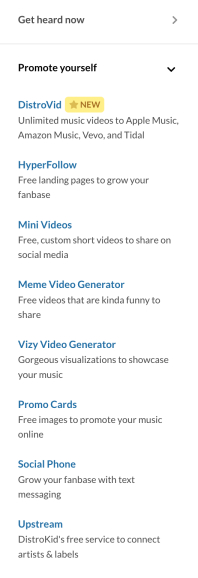
There are some more smaller features that DistroKid does offer for free. They're located in the "Goodies" drop down in your DistroKid account.
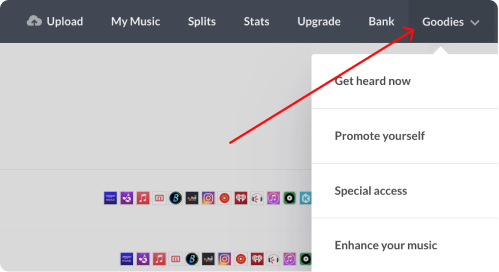
There are some more feature that I would like to point out too. The first one is, DistroKid HyperFollow Link. I think this is a valuable free feature that can be used pre-release and post-release. It's a landing page that filters people to the streaming service they most desire. Think of it like a website air traffic controller for your audience.
Here's an example of a DistroKid hyperfollow link for my latest single I Can Be.
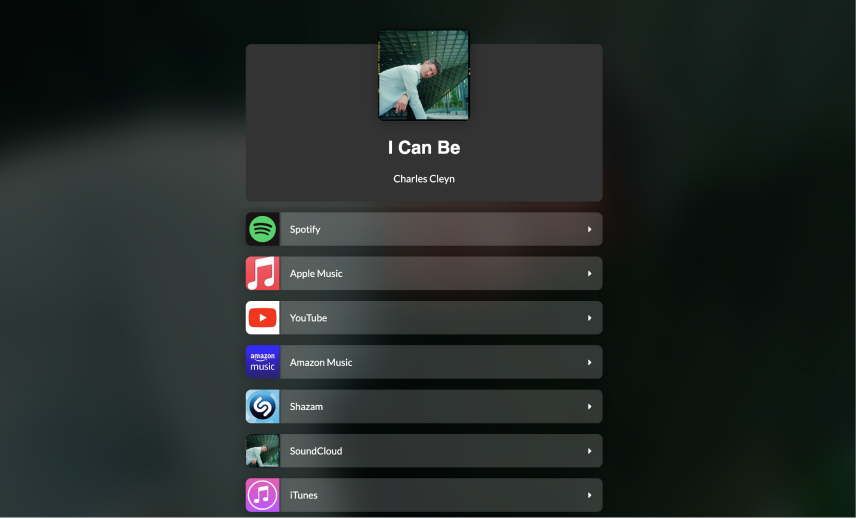
You can easily find what music streaming service you'd like to listen to. This is also very helpful when you'd like to stir up some buzz before your song is released. You can send people to this page to pre-save your song.
Let's move on and talk about some of the extra features on TuneCore now.
TuneCore Extra Features
The biggest TuneCore feature that sets it apart from DistroKid would be Tunecore Music Publishing.
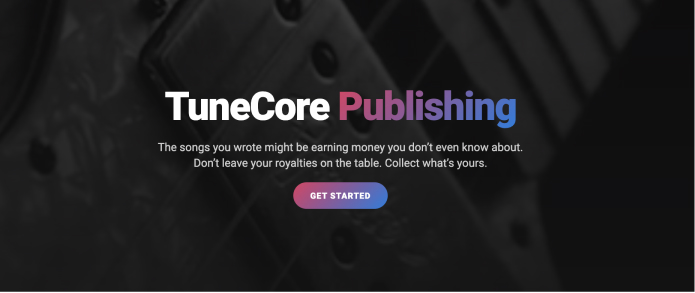
What is TuneCore Music Publishing?
In a nutshell, TuneCore music publishing is when someone collects your music royalties on your behalf. You can think of them as your song manager. They are responsible for making sure you get paid for every "play" the song receives. Some music publishers are go above and beyond and look for opportunities for your song. For example, they are connecting with film makers and tv stations to try and get a placement for your song.
TuneCore acts as an admin music publisher. This means that they will help collect your music royalties that you might be missing, on a global scale. For example, if your song is played in a café in France. You might not know about it. However, TuneCore will make sure to collect this royalty on your behalf.
How much does TuneCore music publishing cost?

There would be a $75.00 one time setup fee and then you would give TuneCore 15% commission on your royalties. Keep in mind, you keep 100% of your music rights. They're not taking any copyright. However, if we go back to our café in France example. You might make $0.10 dollars on a café stream. TuneCore would keep $0.015 and you would keep the rest.
There is also a 20% sync commission. For example, if TuneCore helps get your song in the next big Netflix show. You might make $10,000 dollars. However, TuneCore would keep $2000. That's a good deal considering they got you onto Netflix!
TuneCore Rewards
There is another paid feature offered by TuneCore called TuneCore Rewards.
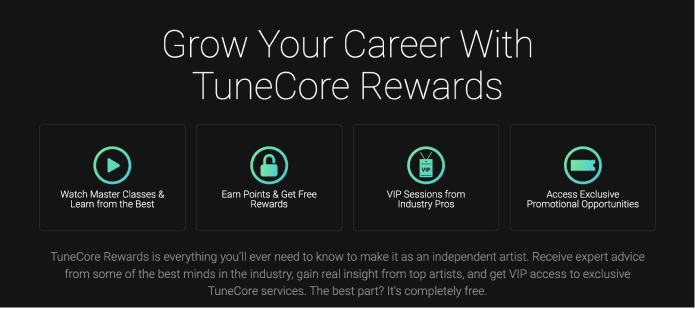
This feature is educational and helps you on your journey as an indie musician. Get VIP access and the opportunity to as questions and seek help. They also even offer 1:1 mentoring with a seasoned professional. Something to definitely check out if you are the studious type.
TuneCore also offers Youtube Content ID and just like DistroKid, they will retain 20% of the revenue you generate on Youtube.

You can see that when we're comparing DistroKid vs TuneCore they offer a lot of extra features. Some cost money but some are included in the cost of your annual fee.
Let's go back and base it off the features that are important to me. From my perspective these would all be "extras". However, having Youtube Content ID would be important and for specific songs that I might be releasing to radio I may want to have music publishing. In this case, TuneCore would be my pick.
On the other hand, if I don't need publishing or artist advice, I might just stick with DistroKid.
Extra Features Winner: TuneCore (if you need music publishing)
Getting Paid

Let's talk a look at getting paid now.
We know that both TuneCore and DistroKid will give you 100% of your royalties, so this section should be short. However, let's go a level deeper and look at a the payout you might get for a song on TuneCore and then another for a song on DistroKid.
I have the opportunity to do this because I've used both platforms. Let's first dive into a Tunecore royalty payout and then compare it to a DistroKid payout.
TuneCore Royalty Payout
Let's take a look at my song What Love Is which was uploaded to TuneCore.
This song earned $99.70 over 34,355 streams.
If we divide 99.70 / 34,355 and round up, we get: 0.0029
DistroKid Royalty Payout
Now let's take a look at my song Don't Start Now which was uploaded to DistoKid.
This song earned $175.71 over 80,992 streams
If we divide 175.71 / 80,992 and round up, we get: 0.0022
Does TuneCore or DistroKid pay more in music royalties?
As you can see from the payouts above, TuneCore has a higher payout.
It does look like a small difference but at scale, on millions of streams, this could add up! You must take this royalty comparison with a large grain of salt though. This happens to do with my streaming numbers alone. There is a lot of moving pieces when it comes to royalties. For example, the royalty is also dependent on the quality of stream. Where did it come from? New York? Mexico City?
If we had a bigger data set, we could make a better judgement call. If you'd be open to sharing your payout per stream on TuneCore or DistroKid then you can do so in a youtube on my TuneCore vs DistroKid video comparison.
Royalties Payout Winner: TuneCore
Customer Service

Let's take a look at our final topic of comparison between TuneCore vs DistroKid and dive deep on customer service. This was a big one for me at the beginning when I was choosing a music distributor. When you are just starting out as an indie artist you have a ton of questions that come up. For example:
- How do I claim my Spotify artist page?
- I already have an ISRC code what do i do?
- How can I switch music distributors?
There's many more questions that will come up along the way and it's important you get the answers you need. However, not only that you get them, but how fast you get them. Now that I'm more of a seasoned professional, with regards to releasing music, customer service is less important to me since I've been around the block a few times.
TuneCore Customer Service
TuneCore has their customer service built right into the TuneCore pricing plan. You can rest assure that if, for example, you sign up with the Breakout Artist plan at $29.99/year then you will get a customer service response time of 3 business days. That's nice to know, especially when you need help. On the Professional plan you can get customer service response times of 1 business day. That's incredible!

I've had some experience reaching out and talking to the TuneCore customer service team. I've always been impressed by their response time. When I released my song Nothing But The Glory I needed the Spotify URI code to create a Spotify pre save landing page. I had know idea what that was. I reached out and got a fast response with the answer.

DistroKid Customer Service
DistroKid's customer service is not built into their pricing plans like it is on TuneCore. That's not super reassuring if you're a new artist because how do you know if you're going to get help? Especially when you need it.
However, when that said. DistroKid does have a customer service centre and you can submit a request to them here. You don't know when they will respond to you but it usually takes anywhere from 3-7 business days. I believe it also has to do with the complexity of your request as well. Easier requests may get faster response times.
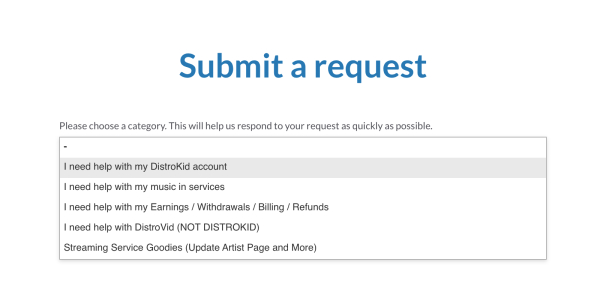
DistroKid does happen to use the same email support system as TuneCore so they almost look identical. I've had to reach out to DistroKid support to ask questions and they are as equally helpful and pleasant as the TuneCore customer service team.
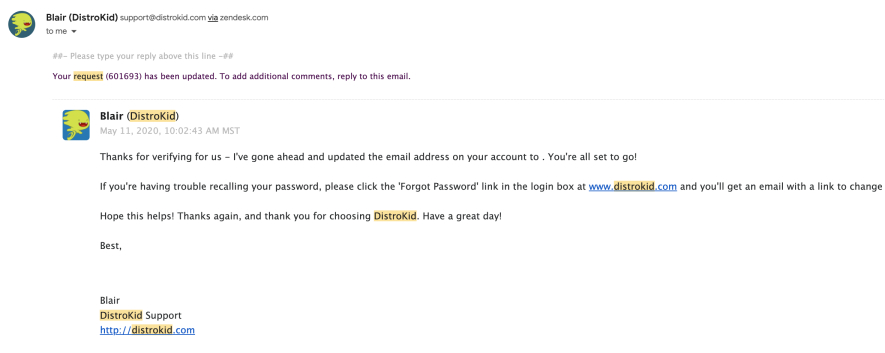
Customer Service Winner: TuneCore
I have to crown TuneCore as the winner here because of the customer service guarantee response times that are included in the pricing plan. I think DistroKid has a pleasant support team but we're left in the dark not knowing when you might get an answer.
Overall Winner
Let's take an overall look at who is a better music distributor when we're reviewing Tunecore vs DistroKid.
If you've been following my perspective throughout this post then you'll likely expect that your choice of music distributor does come down to what your needs are. TuneCore has a variety of different features that DistroKid doesn't have. For example, TuneCore music publishing and artist advice. They also have cheaper annual fees that include different things like scheduled release date, customizable label name, and customer service.
On the other hand, we have DistroKid which has a variety of features that TuneCore does not have. They have a hyperfollow page, social phone number, auto-normalization, leave a legacy, video and meme generator. They also have reasonable annual plans that include scheduled release date and customizable label name.
For me, the winner is TuneCore based on my needs.
What are your needs? Do you need music publishing? Do you need customer service? Do you need customizable label name?
Write these out and after you do so, I'm sure you'll have a much better idea of what music distributor you should go with.
I can offer you a discount on TuneCore and DistroKid at the links below. Enjoy!
Here's a 20% discount to sign up with TuneCore.
Can You Switch Music Distributors?
I wanted to add this section to the post just in case you might have made a mistake. Let's say you signed up to DistroKid but then you want to switch to TuneCore or vice versa. Yes, it's possible to switch music distributors.
It's actually quite simple to do.
Here are the steps you will want to follow to switch music distributors. By the way, I have a video on how to switch music distributors and I walk through an example.
Step 1:
Decide on what music distributor you would like to switch to. Let's say you want to move from DistroKid to TuneCore.
Step 2:
Sign up to TuneCore. You can get 20% discount if you sign up with this link. Do not cancel your DistroKid account just yet. We'll do that later.
Step 3:
Go through the process of adding a new single to TuneCore. This step is crucial. It's very important that you have all the meta data exactly the same as how you uploaded your song to DistroKid.
This is the meta data I'm talking about:
- Artist Name
- Song Name
- Artwork
- ISRC code and UPC code
- Primary genre and secondary genre
- Language, record label, and credits
Step 4:
Once you've complete the song upload. Set your release date on TuneCore and complete the process.
Step 5:
Wait until your song has been uploaded, by TuneCore, to all the streaming services. When you get a response from TuneCore that your song has been uploaded to all the streaming services, you can go and remove your song from DistroKid.
Step 6:
Request a song takedown from DistroKid. You might have to wait about a week for everything to smooth out on Spotify. If you've uploaded your single to TuneCore with all the same meta data mentioned above then you won't have a problem.
Need More Help With Music Distribution?
I'm an independent musician and I make a living from creating music.
If you'd like you can sign up to my music distribution links below and I receive a small payout so it helps support me, in return, you get a discount. Win Win. Simply sign up at the link below and you will get the discount on checkout.
I also teach Logic Pro, GarageBand, and Music Production. You should consider subscribing to my Youtube Channel. I often publish videos about music distribution, music marketing, and music production. Anything that might help you on your journey as an indie musician. Say hi in a Youtube comment or send me an Instagram message.








